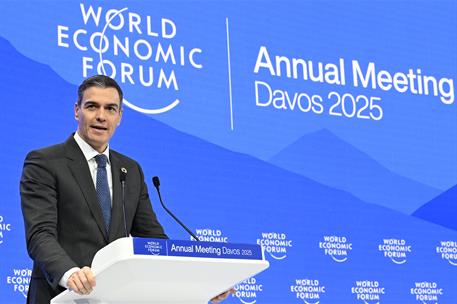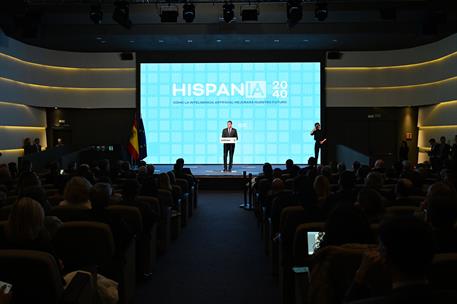Pedro Sánchez announces new initiatives to prevent "the digital space from becoming the Wild West"
President's News - 2025.2.5
Matadero Reader's House, Madrid
The President of the Government of Spain, Pedro Sánchez, during his speech at the presentation of the Digital Rights Observatory (Pool Moncloa/José Manuel Álvarez)
The President of the Government of Spain, Pedro Sánchez, has announced new measures to oppose the "ruthless technological race" and the "plan designed" by the "technocrat", authoritarian powers and anti-system forces, and to prevent "the digital space from becoming the Wild West". Among the initiatives, it is worth highlighting the progress made in putting an end to anonymity on social networks, deepening algorithmic transparency to "make moderation and self-control a legal requirement" and guaranteeing that platform managers take personal responsibility for the impact their content has.
This was announced during the closing ceremony in Madrid to present the Digital Rights Observatory, launched by Red.es with the support of dozens of companies, institutions and universities, with special support from the Hermes Foundation, to protect rights and freedoms in the digital world. The Minister for Digital Transformation and Public Function, Óscar López, also took part in the presentation, as did the Minister for Territorial Policy and Democratic Memory, Ángel Víctor Torres, the Minister for Economy, Trade and Enterprise, Carlos Cuerpo, and the Minister for Equality, Ana Redondo.
Pedro Sánchez argued that "people cannot be insulted, threatened, swindled and abused without any kind of consequence". "Faith in technology and its promises has blinded us to its worst consequences", he lamented, referring to the release of digital products and services onto the market "without their risks and potential damage being controlled", and urged that there is a need for "preventing, combating and eradicating once and for all the manipulation and misuse of digital environments".
The President of the Government of Spain, Pedro Sánchez, closes the presentation of the Digital Rights Observatory with his speech (Pool Moncloa/Fernando Calvo)
Although he stressed that the digital revolution "has transformed our lives, the way we work, live and even love", has "turned our economies upside down" and has modified the civic space by opening up spaces, he warned that "under the auspices of being an economic, social and cultural miracle, much misery is hidden", because "the algorithm does not distribute opportunities, because the big platforms are not neutral and lies travel faster on them than the truth".
"Social networks are real battlefields"
In this respect, he referred to the immediacy and the "obsession with 'likes'" that "distorts reality and impoverishes public debate" and denounced the fact that "social networks today are real battlefields, where people do not discuss, but attack, do not argue, but disparage, and do not seek to understand, but to impose". The main consequence, said the chief executive, is that "very often what goes viral on social networks is lies", with false data, modified images and fake news, as happened during the floods in Valencia when "thousands of bots tried to worsen the damage by spreading hoaxes".
However, he stressed that what happens in the digital world has consequences for digital life. In fact, he pointed out that digital crimes already account for a fifth of all criminal offences, one in four young people receive unwanted sexual solicitations, and online hate crimes grew by 32% in the last year.
"We thought the platforms would help level the playing field, but they have made it more unfair. One third of social media profiles are bots, which generate almost half of all internet traffic. The searches, content and news we consume are biased. Virality is worth much more than the truth", Pedro Sánchez added.
Taking action to achieve "human and humanistic" digitalisation as opposed to a "technocracy" that will do "anything for money"
In his opinion, this is due to "a systematically designed, planned and executed plan" by "foreign powers, such as Russia, which seeks to weaken our democratic institutions, by anti-system forces that seek to generate chaos in our societies, either to achieve power or to take advantage of the vulnerable, and now by a small group of millionaires for whom it is not enough to have more money than 150 countries put together".
Group photo during the presentation of the Digital Rights Observatory (Pool Moncloa/Fernando Calvo)
"They also want political power. Sitting directly in the Councils of Ministers, without masks or mediators. Controlling our laws and our lives. Conditioning what we see and what we think. Even our memory as a society, if necessary by fostering authoritarianism and hatred, but make no mistake: their main motivation for controlling democratic power is none other than money. It's all for money", he decried.
The President of the Government of Spain pointed out that this is a "ruthless technological race that combines the technocrat and authoritarian powers that are waging a battle without rules or principles in the digital world and that have an impact on real life" and a "technology at the service of power and ideology" that also wants to establish artificial intelligence "without dissent". Faced with those who "promote absolute deregulation for the technocracy", Pedro Sánchez has called for "rebellion" with an alternative led by Spain and for Europe to consolidate a model of technological development that contributes to economic growth while fully respecting the digital rights of citizens with "human and humanist digitalisation".
Regulation: an end to anonymity on social networks with moderation and algorithms
In this way, he supported the three measures with European implications that he proposed at the Davos World Forum to protect citizens and take back control of the platforms, such as putting an end to the anonymity that "poisons social networks and cannot be an excuse for impunity". "In the same way that it is not possible to drive a car without a licence plate or board a plane without identifying ourselves, we cannot allow those who harass other citizens, spread lies or spread hatred to do so with impunity," he asserted.
The chief executive has also called for progress in defending citizens' digital rights and deepening algorithmic transparency: "we must force platforms to share the information needed to supervise them and make moderation and self-monitoring a requirement, a legal requirement". He announced that "we are going to reinforce, from an equipment and personnel point of view, the capacities of the European Commission's Centre for Algorithmic Transparency", located in Seville.
In addition, in the coming weeks, the Government of Spain will approve the designation of the National Markets and Competition Commission (CNMC) as the Digital Services Coordinator, and we will provide it with the equipment and human resources it needs to supervise the activity of digital platforms.
Responsibility of the "techno-billionaires"
Pedro Sánchez also stressed the need for "CEOs of companies not to shy away from fulfilling their obligations, like businesspeople, any self-employed person or worker, and that, when they do so, they should answer for the damage caused by their platforms", so that they work to guarantee personal responsibility in the digital era and that "techno-billionaires and technological giants should answer for their actions and the damage caused by their algorithms".
The President of the Government of Spain, Pedro Sánchez, and the Minister for Digital Transformation and Public Function, Óscar López, talk with the citizens who have participated in the event (Pool Moncloa/Fernando Calvo)
For this reason, the Executive is studying mechanisms to ensure platform operators' legal responsibility, guaranteeing that they can be judicially accountable if rights and freedoms are infringed on their platforms.
The second "priority" front for action is promoting digital and technological sovereignty, with which Europe and Spain are already making progress, because "Europe cannot depend on others to define its digital future". "We cannot allow our data, infrastructure and communications to be left in the hands of foreign powers or companies without democratic control. We need to invest in innovation, develop our own technologies and infrastructure and strengthen a regulatory framework that protects our citizens," he reiterated.
He called for Europe to "lead its digital transformation with clear rules, firm values and the ambition to be a world benchmark for ethical and responsible technology", which means "developing its own browsers, European public and private social networks, and messaging services that use open protocols".
The chief executive has declared that, in the European Commission, Spain will support the development of an investment plan for promoting public-private infrastructures, in line with the national digital infrastructure developed by Spain, which this month launched the first model of ALIA, the new Artificial Intelligence family in Spanish and co-official languages. In addition, the Government of Spain is mobilising 150 million euros to accelerate the adoption of AI in Spanish companies.
Spain was also one of the first countries in the world to have a Charter of Digital Rights during the pandemic. "The Digital Rights Observatory shares the same philosophy: to make these rights real, tangible and effective in the lives of all people through public-private collaboration, with the participation of academia, business and civil society. We are facing a decisive moment, which forces us to choose between two alternatives: either we follow the course set by others and go with the flow, or we take the lead in defining a new way of understanding, designing and building technology. Let us opt for the latter: to be masters of our own destiny", concluded Pedro Sánchez.
The Minister for Digital Transformation and Public Function, Óscar López, during his speech at the event (Pool Moncloa/Fernando Calvo)
Óscar López: "If we want a safe digital space, we have to regulate it"
At the start of the event, the Minister for Digital Transformation and Public Function, Óscar López, also spoke, proclaiming that "it is necessary to regulate digitalisation to order coexistence and protect people. When cars appeared on our roads, that is when traffic lights were invented". "The road will not be easy and resistance will be tireless, as it already is, but if we want a secure digital space we must take a stand, and the Government of Spain, with its president at the wheel, is clearly making a stand on this matter. A stand against denialism through science, against hoaxes by seeking the truth, and against the technocratic approach by promoting digital rights," he emphasised.
Non official translation








